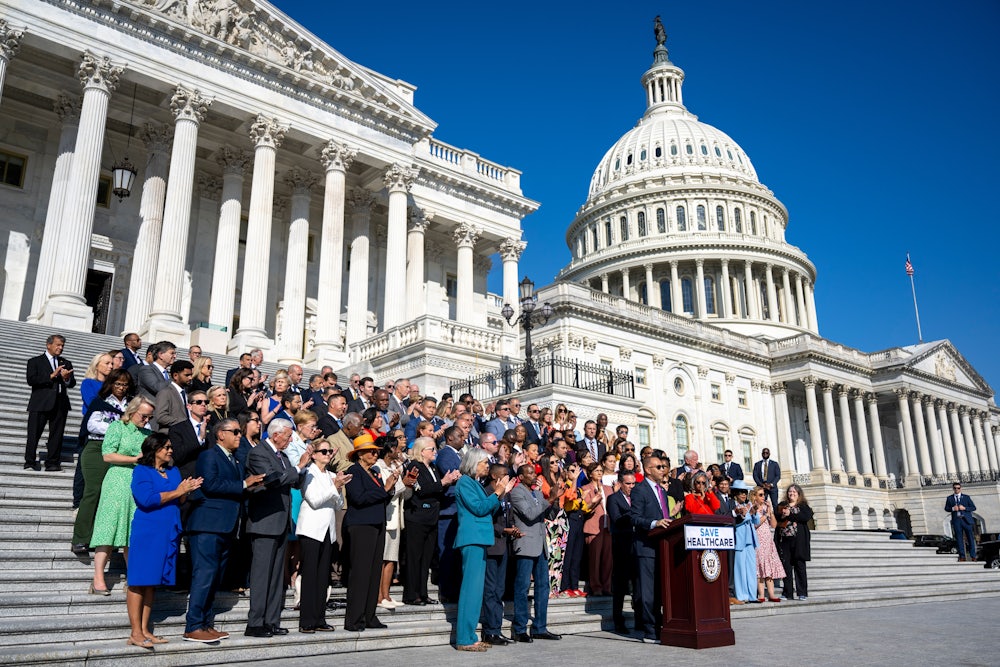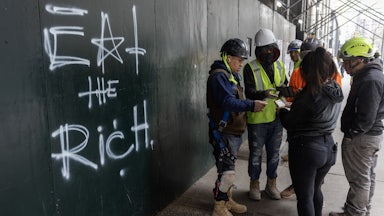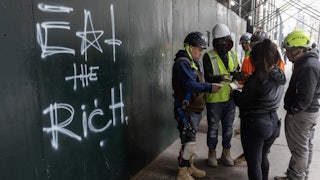Even as authoritarianism rages on, thinkers, writers, and strategists on the left have turned their eyes to the next presidential election. How can Democrats win back the House, maybe even the Senate, and hopefully the presidency? To pull off that feat, they will have to reverse an electoral trend that has left them on the outside, looking in: the flow of voters without college educations—the largest of the voting blocs—who are leaving the party for Trump’s brand of Republicanism.
Two strains of thought are emerging on how to win them back. Neither side quite has its message together yet, but both groups are striving to at least define what it is in their party’s status quo that they’re fighting against.
The shiniest, newest path toward salvation, many Democrats believe, is the Abundance movement, which celebrated its second annual conference in Washington, D.C., earlier this month. Though the message of Abundance, the book by Ezra Klein and Derek Thompson, wasn’t explicitly centrist, its call to cut red tape, including some of the environmental reviews and diversity imperatives that they argue can slow down government construction products, has appealed to pundits who want to distance themselves from the far left.
At its core, abundance is a pro-growth argument—especially when it comes to areas where Americans feel shortages most, like in housing and mass transportation. But the mechanisms for building more and building faster that the book focuses on are snoozy issues like zoning and bureaucratic reform. Polling shows that “cutting red tape” is not a popular political message. Ahead of the conference, Abundance 2025, Blue Rose Research, the outfit led by Democratic polling guru David Shor, surveyed voters and found that messages “focused heavily on process changes” were not very effective at appealing broadly to voters.
Proponents of abundance know that they have a policy argument but not necessarily an electoral strategy. Some embrace that, said Misha Chellam, a founder of the Abundance Network, which helped sponsor the conference. “They’re like, ‘Abundance is a governing framework, not a campaigning framework,’” he said. “And so, it’s a different set of questions you have to answer to win elections.” Some abundists believe that increasing the speed with which government builds will be enough to help get them credit with voters.
But an electoral argument was waiting in the wings among centrists and quickly tied itself to the abundance agenda. There have long been pundits on the center-left, lately including Ruy Teixeira and Matt Yglesias, who argue that Democrats should moderate on cultural issues. A new think tank launched Wednesday takes that as a founding ethos. The Searchlight Foundation is headed by Adam Jentleson, who has worked with the late Senator Harry Reid of Nevada, the presidential campaign for Senator Elizabeth Warren of Massachusetts, and Pennsylvania Senator John Fetterman. Jentleson has argued that Democrats have been pushed into unpopular cultural positions by interest groups, especially on issues around transgender rights and immigration.
“The Groups,” as they are known by the popular centrist invective, also carry some of the blame for Abundists who argue that concerns like the environmental impact of building projects or union labor and diversity requirements hamstring Democratic efforts to empower the government and contractors to get things done. “They are happy to jettison environmental groups, public sector unions, other groups as well,” said Henry Burke of the Revolving Door Project, who authored a report earlier this month showing the people and groups helping to fuel the movement.
In fact, some prominent backers of Abundance conferences and organizations, including John Arnold of Arnold Ventures, a former hedge funder, have long fought public-sector unions. Other groups with the movement, like the Breakthrough Institute and ClearPath, distance themselves from other environmentalists. At the centrist WelcomeFest, hosted by WelcomePAC earlier this year, many speakers championed abundance and the writer Josh Barro blamed unions for lack of progress in blue cities.
In a New York Times opinion piece written by Jentleson after the election, Jentleson also blamed The Groups for Trump’s win, focusing instead on those organized around identity. “Democrats remain stuck trying to please all of their interest groups while watching voters of all races desert them over the very stances that these groups impose on the party,” he wrote. While Jentleson isn’t explicitly tied to the Abundance movement, this thinking fits right in.
The argument centers on the idea that working-class voters have been alienated by a Democratic Party that’s become too swayed by its new college-educated base on cultural issues, and it needs to moderate to win these voters back. Searchlight argues that Democrats either ignore polling showing them their positions are unpopular or engage in wishful-thinking polling to try to show that they are.
Whether this is the right take on issue polling is questionable, but polls do hold another answer. In the Blue Rose memo, messages on housing affordability that were more persuasive to voters focused on capping rents, rental assistance, protecting renters from landlords, helping families with mortgages, building more homes, and fighting developers and corporate landlords. In other words, a more traditional populist message.
A polling memo published earlier this month from Hart Research and Groundwork Action, the advocacy affiliate of the liberal group Groundwork Collaborative, also showed that a message that blamed corporations and billionaires for the problems of working people and cracking down on price gouging, raising taxes on the wealthy, and reducing corporate lobbying power was more appealing than one focusing on cutting red tape, reducing labor and environmental standards, and “unleashing the private sector.”
This old-fashioned populism has a long history in American politics, and focusing on inequality is popular. “It’s never been the case that Americans have been supportive of high executive pay,” said Leslie McCall, a sociologist at the CUNY Graduate Center who studies attitudes on socioeconomic inequality. “No matter what measure you use, there’s an underlying sense that inequalities are too high, and the rich are paid way too much.”
That may prove a liability for the abundance movement; some very rich people are closely associated with it, including Silicon Valley power brokers such as Patrick Collison, CEO of Stripe, and Arnold. Proponents in the tech billionaire world were championing the abundance idea even before the book came out, Burke said. McCall thinks American voters keep electing a party that cuts taxes for the rich and increases inequality despite what they believe for many reasons, but one is that they haven’t yet had reason to trust the Democratic Party to do anything about it over the long term.
Democrats need a more credible messenger, and they’ve had several candidates over recent cycles, like Warren, Democratic mayoral candidate Zohran Mamdani in New York, who has said, “I don’t think we should have billionaires,” and Senator Bernie Sanders and Representative Alexandria Ocasio-Cortez with their Fighting Oligarchy Tour, which while perhaps not possessing the catchiest name for a movement, regularly draws big crowds. While none of these figures have the upper hand among party elites, they’ve gotten a huge head start on the new centrist rebrands: They have spent much of the past decade building an audience for their message, and building an audience takes time.
Naturally, in three and a half years, everyone on the Democratic side of the fight might have a villain to take aim at that is more salient than generic “billionaires” or “The Groups,” in President Donald Trump and his expanded universe of cronies and villains—a purported billionaire surrounded by other extremely wealthy people, who now looks to be on path to wreck the economy, despite winning voters’ trust on that very issue. If that happens, the reasons Democrats lost in 2024 might be less important than they seem now because we’ll all have lost so much by the time the next election rolls around.










